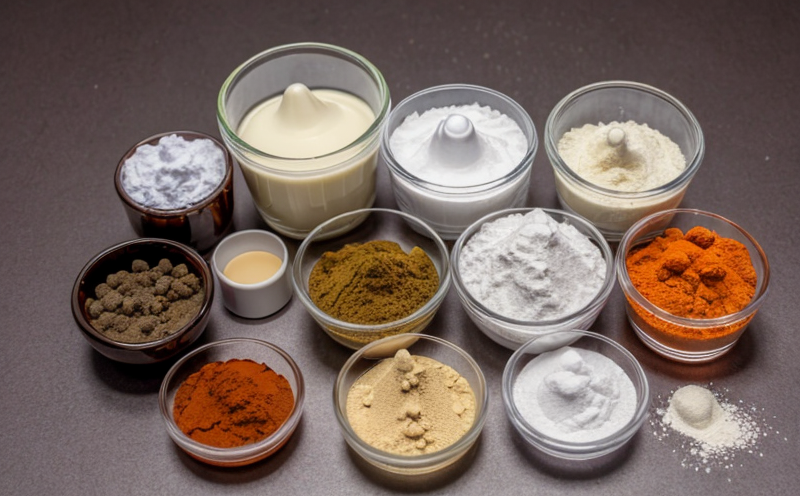GMP Compliance Excipient Testing
Good Manufacturing Practice (GMP) compliance is a critical factor in ensuring the quality and safety of pharmaceutical products. In this context, excipients play a pivotal role as inactive ingredients that enhance the stability, efficacy, and palatability of formulations. GMP compliance ensures that these excipients are manufactured, processed, packed, stored, and handled in strict accordance with legal requirements designed to minimize the risk of contamination.
Our service focuses on comprehensive testing for excipients to ensure they meet stringent regulatory standards set by global bodies such as the FDA, EMA, WHO, and others. This includes validating that excipients are free from contaminants, impurities, and other substances that could compromise product safety or efficacy. Proper GMP compliance also ensures that excipients maintain consistent quality throughout their lifecycle.
The testing process involves a series of rigorous procedures to assess the physical, chemical, biological, and microbiological properties of excipients. These tests are conducted using advanced analytical techniques such as High-Performance Liquid Chromatography (HPLC), Fourier Transform Infrared Spectroscopy (FTIR), and Gas Chromatography-Mass Spectrometry (GC-MS). The results provide a detailed understanding of the excipient’s composition, purity, stability, and potential interactions with active pharmaceutical ingredients (APIs).
For instance, we conduct tests to confirm that an excipient is free from heavy metals like lead or arsenic. We also ensure that it complies with microbial limits according to international standards such as ISO 14644-1 and USP General Chapter 71. These tests are critical for maintaining product integrity, ensuring patient safety, and facilitating regulatory compliance.
In addition to standard testing protocols, we offer customized solutions tailored to the unique needs of our clients. This includes evaluating excipients based on specific client requirements or industry trends. For example, if a client is developing a novel formulation that requires an excipient with enhanced bioavailability, we can design tests to evaluate this aspect in detail.
| Aspect | Description |
|---|---|
| Sampling | Excipients are sampled under controlled conditions to ensure they represent the actual batch being tested. |
| Analytical Techniques | High-Performance Liquid Chromatography (HPLC), Fourier Transform Infrared Spectroscopy (FTIR), and Gas Chromatography-Mass Spectrometry (GC-MS). |
| Microbiological Testing | Testing for microbial limits in accordance with ISO 14644-1 and USP General Chapter. |
| Stability Studies | Evaluating the stability of excipients over time to ensure they remain suitable for use. |
Scope and Methodology
- Sampling: Excipients are sampled under controlled conditions to ensure they represent the actual batch being tested.
- Analytical Techniques: High-Performance Liquid Chromatography (HPLC), Fourier Transform Infrared Spectroscopy (FTIR), and Gas Chromatography-Mass Spectrometry (GC-MS).
- Microbiological Testing: Testing for microbial limits in accordance with ISO 14644-1 and USP General Chapter.
- Stability Studies: Evaluating the stability of excipients over time to ensure they remain suitable for use.
Why Choose This Test
- Promotes GMP Compliance: Ensures that all excipient manufacturing processes meet stringent regulatory standards.
- Guarantees Quality: Provides detailed insights into the composition, purity, and stability of excipients.
- Enhances Safety: Identifies potential contaminants or impurities that could compromise product safety.
- Facilitates Regulatory Compliance: Ensures compliance with global regulatory bodies such as FDA, EMA, WHO, etc.
- Saves Time and Costs: Reduces the risk of costly recalls and rejections by identifying issues early in the development process.
- Customized Solutions: Offers tailored testing solutions to meet specific client requirements or industry trends.
- Expertise and Experience: Our team consists of experts with extensive experience in pharmaceutical testing, ensuring accurate and reliable results.
International Acceptance and Recognition
The importance of GMP compliance excipient testing is widely recognized by regulatory authorities around the world. Regulatory bodies such as the FDA, EMA, WHO, and others mandate that pharmaceutical products meet strict quality standards to ensure patient safety and efficacy.
Excipients are tested against international standards such as ISO 14644-1 for cleanroom classification, USP General Chapter 71 for microbial limits, and ICH Q5D for impurities. These standards provide a framework for ensuring that excipients meet the highest quality benchmarks.
Our service not only meets these global standards but also exceeds them by offering comprehensive testing services that go beyond basic compliance to ensure excellence in every aspect of pharmaceutical manufacturing. By adhering to international best practices, we contribute to the development of safe and effective medications for patients worldwide.





